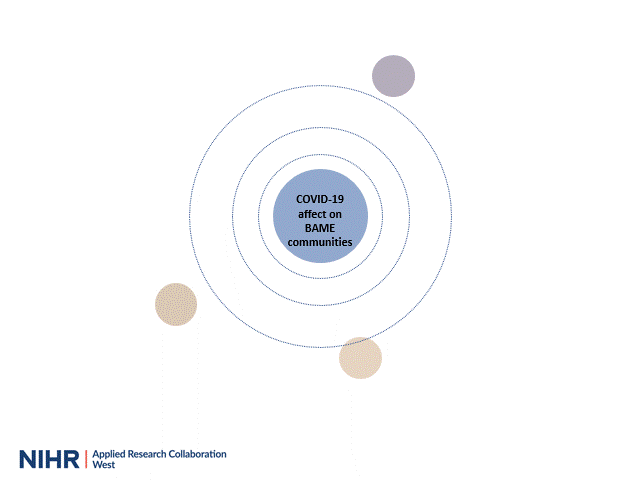ARC West rapid review explores disproportionate impact of COVID-19 on black, Asian and minority ethnic communities
18 June 2020
The risk of death from COVID-19 is higher among black, Asian, and minority ethnic (BAME) people than the white British population. An ARC West rapid review commissioned by Bristol City Council and led by Dr Loubaba Mamluk and Dr Tim Jones explores why this is the case and offers a summary of policy recommendations that could help reduce these health inequalities.
The researchers found a complex mixture of factors, including being poorer, where people live, overcrowded housing, types of job, other illnesses and access to health services, all influenced BAME communities’ outcomes. No one factor alone could explain all of the disparities found.
Recommendations that the review uncovered include:
- ensuring adequate income protection for those in low paid or precarious employment, so workers can follow quarantine recommendations
- reducing occupational risks, such as providing appropriate personal protective equipment (PPE)
- providing culturally and linguistically appropriate public health, developed with affected communities and tailored to culturally specific challenges, such as preventing transmission in overcrowded households or shielding vulnerable people in multigenerational households
- removing all NHS charges during this public health emergency could ensure that no migrant or individual from a BAME group delays seeking healthcare and risks death through fear of being charged for their NHS care

An animated diagram showing the how COVID-19 affects BAME communities
The findings have been presented at the 2nd Global Leaders Summit – Tackling Endemic Discrimination Post COVID-19, as well as to Bristol City Council and other community leaders.
Councillor Asher Craig, Deputy Mayor of Bristol and Cabinet member for Communities, commissioned the report alongside Bristol’s Mayor Marvin Rees. Councillor Craig said:
“We have watched with increasing concern the disproportionate impact the current COVID-19 crisis is having on the city’s most vulnerable communities and this review, commissioned from academic colleagues through ARC West, confirmed what we were observing and experiencing.
“COVID-19 has exposed uncomfortable truths and glaring disparities and inequality that exists in society and our city and the review found that health status is an outcome of broader structural, social and economic condition, such as unequal representation, income and social circumstances, compounded by the generational impacts of stress from living with endemic discrimination and racism.
“We are determined to work with communities and the city to change this and the review has produced a range of recommendations for action, including around income protection for low-paid workers, improving public health communication and data collection in health inequalities work and building BAME representation and involvement in senior healthcare leadership and these actions are being progressed through the Bristol COVID-19 Race Equality Board.’’
Dr Mamluk said:
“This is not the first pandemic to expose existing structural inequalities. COVID-19 has shown that people of minority ethnic backgrounds again are disproportionately affected by health and social inequalities.”
The review has also been quoted in Parliament by East Bristol MP Kerry McCarthy:
Our rapid review on the disproportionate impact of #COVID19 on #BAME communities has been brought up in Parliament, in this speech by @KerryMP. Full report is here, including policy recommendations:https://t.co/BxvKi9ox3l
Well done @LMamluk @TimJones1978 #HealthInequalities https://t.co/BeQex3qcMF— NIHR Applied Research Collaboration (ARC) West (@ARC_West) June 22, 2020
This rapid review is part of ARC West’s co-ordination of the local applied research community’s response to the COVID-19 pandemic. Another review from this project was led by Dr James Nobles looking at the mental health impact of COVID-19. This review has been used by the Department of Health and Social Care to inform their planning for vulnerable groups.